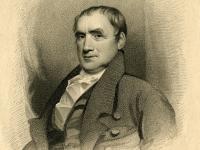The Historical Society of Pennsylvania (HSP) recently acquired two new collections, including diaries from Philadelphia publisher Mathew Carey dating from 1828-1836 and more than 300 letters from Carey’s son, Henry Charles Carey. These two collections are an invaluable resource for scholars and shed new light on Mathew Carey, an Irish immigrant who founded and operated America’s most successful publishing house.
The acquisition is one of the most significant additions to the Historical Society’s archives in the past decade. The newly acquired Carey collections will complement the Historical Society’s already rich collection of Henry Carey manuscript materials. “Even before this latest acquisition, the Historical Society of Pennsylvania had one of the most comprehensive collections of Carey documents in the nation,” said Lee Arnold, Senior Director of the Library and Collections. “We are thrilled to add these two collections to our holdings, and believe that they will be of great interest to scholars and researchers.”
Researchers can access the new collections at the Historical Society of Pennsylvania’s library at 1300 Locust Street in Philadelphia during regular library hours. For more information, visit www.hsp.org.
The first collection includes two volumes of diaries belonging to Mathew Carey (1760-1839). In addition to founding a publishing house, Carey is well known for having helped establish many charitable institutions. He wrote numerous pamphlets and newspaper articles on a wide range of political, economic, and cultural topics, particularly regarding Irish and Irish-American concerns. The two diaries, which contain a total of 353 written pages plus one detached two-page leaf, contain lengthy descriptions of Carey’s daily activities, including extensive reading, writing, editing, publishing, meetings and conversations (including some with well-known persons such as Robert D. Owen). Entries document Carey’s relationships with local newspaper editors,complex and shifting views on economics, activities on behalf of poor and marginalized groups, religious activities, family life, and other matters. Several biographical sketches and an excerpt from Carey’s intended autobiography are included.
The second collection includes correspondence from Henry Charles Carey dating from 1846 to 1848. Carey (1793-1879) was for two decades a partner in the printing and publishing business founded by his father, Mathew Carey, then left the firm to devote his time to writing. He became one of the most influential American economists of the 19th century, served as economic advisor to President Lincoln, and was a leading member of the “American School,” which advocated protectionism and a strong government role in promoting industrial development. He also co-founded the Franklin Fire Insurance Company.
This collection features 312 incoming manuscript letters (476 pages) and 78 retained manuscript copies (117 pages) of Carey’s outgoing correspondence. Correspondents include industrialists, politicians, publishers, scientists, cultural figures, and members of Carey’s extended family. Letters address a variety of economic, political, and cultural topics; the printing and publishing of Carey’s works; other aspects of the publishing and bookselling industries; management of the “Carey tract” in Schuylkill County, Pennsylvania; disagreements about the execution of Mathew Carey’s will; and other personal and family matters.
These two collections will join other Carey materials already in HSP’s archives, including records in the Society’s Lea & Febiger records (Collection 227B), Edward Carey Gardiner collection (227A), and other collections. HSP expects these new collections to be of immediate interest to those studying the history of 19th-century publishing, economics, industrial development, and Philadelphia’s business class.
About the Historical Society of Pennsylvania
Founded in 1824 in Philadelphia, the Historical Society of Pennsylvania collects and shares the stories of Pennsylvania. It is home to some 600,000 printed items and more than 21 million manuscript and graphic items. Its unparalleled collections encompass more than 300 years of America’s history—from its 17th-century origins to the contributions of its most recent immigrants. The society’s remarkable holdings together with its educational programming make it one of the nation’s most important special collections libraries: a center of historical documentation and study, education, and engagement.

